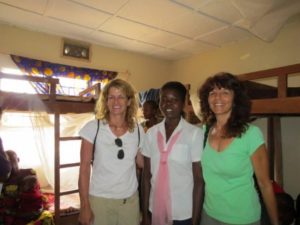“Sexual violence.” We hear these two words over and over in Congo. They have become a part of the vernacular — and in many ways are a symptom of a highly traumatized society. In every meeting, sexual violence is mentioned and everywhere we go, we meet girls, women and children who have survived rape and assault. And over and over again, we discuss the fact that as long as women are in a subordinate position in society, they will bear the brunt of the anger and frustration of failed systems and inadequate resources.
Congo is certainly not alone in wielding rape as a weapon of war. During the Rwandan Genocide 500,000 women were raped. On our visit to Rwanda just a few days ago, we heard stories of some women being assaulted with eight-foot-long sticks that destroyed their insides before they were killed. In Sudan, rape is used as a way to destroy families and communities. These examples of the violence wrought against women are not the first of their kind and continues unchallenged in many places.
Today we visited our partner and one of my personal heroes, Dr. Denis Mukwege, the Congolese gynecologist who founded Panzi Hospital in 1999 in Bukavu, DRC. Dr.Mukwege has become the world’s leading expert in repairing fistula — damage done to the internal organs of women that can occur during rape.
We discussed the situation in DRC and he told us that the failure to protect women is the “failure of humanity and the beginning of the dissolution of humankind.” These are desperate words, but understandable from someone who treats 1,200 women a year for rape. His patients arrive demoralized, bleeding, and often leaking urine and fecal matter. But Dr. Mukwege has not given up. He is continuing to develop programs that will empower, educate and help to emotionally heal these women.
One of these programs is Maison Dorcas, a residential facility built to house women who face such deep stigma from their families and communities about the crime committed against them that they cannot return home. Maison Dorcas is a haven – not only a safe space to live in, but also a place of real healing, community support and empowerment. A pristine new Maison Dorcas facility will soon open its doors to 200 women survivors to help them heal and rebuild their lives. The JWW-funded Tumaini (Hope) Project at Maison Dorcas, helps to educate and train these women in marketable vocational skills that afford them the opportunity to rebuild their lives.
It is interesting to me — and hopeful — that when I meet young girls in Congo with ambition and desires, they often want to become lawyers. When you ask why, she always says something to the effect of, “the rights of women and girls are neglected, and I want to fight for them.”
I met one such young woman today. Brigitte is 16 years old and a survivor of sexual violence. With her baby, she found her way to an amazing program for young mothers, run by our wonderful partner Amani Matabaro. Despite all she has been through, and missing a year or two of school, this young woman is determined to complete school and become a lawyer to fight for the rights of all young women in Congo. Today, Brigitte is number one in her class.
In the same village, there was also a young woman who told us her inspiration was Honorine, a policewoman in DRC who was one of the first to arrest and prosecute perpetrators of sexual violence. This young woman wanted to go to college to become a crusader like Honorine.
With young women like these supported by such incredible programs, I have no doubt –and I must believe– that the world will slowly begin to change.


